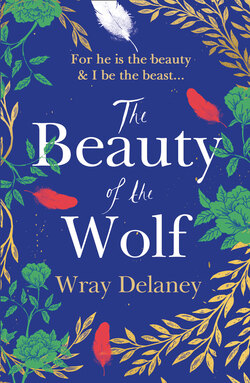Читать книгу The Beauty of the Wolf - Wray Delaney - Страница 13
ОглавлениеV
One May morning, Lord Rodermere, out hunting with a party of friends, thought he saw in a thicket a vixen and set off after her until by twists and turns he became lost. He stopped and shouted out in the hope of one of his party hearing him. And all he saw and all he heard was the chanting melody of birds, quivering leaves, cooling winds, and shadows. The mocking echo of hounds and a distant horn confused his senses. A snake unseen slithered past and so startled his horse that it bolted, taking his lordship by surprise. It was all he could do to hold tight to the saddle and reins as his horse, wild-eyed, nostrils flaring, took flight. Low branches scratched his face and Lord Rodermere fought not to lose his ride.
He is conscious, perhaps for the first time, of how deep and far the forest stretches.
On and on they go, horse and rider, this way and that, he all torn and knocked about, unable to bring his horse under control for in the mind of the creature the snake follows faster than he can gallop. Into the darkness the horse takes his rider. He, too, wild with terror, for was that not the cry of a wolf? And all sight is lost and then it seems he has passed through some unseen curtain into blinding light. The ground beneath his horse is moss, soft moss, and from it rises an intoxicating perfume.
Lord Rodermere thinks to call out. He is rewarded not by the sound of the hunting horn but by a song that has such yearning at its heart that his horse becomes calm and he, enchanted, dismounts. Forgetting how he arrived here he follows the music which calls him on until he comes upon a clearing.
Through the trees, he spies a stream, and under a willow in the dappled light a maiden dressed in an apple blossom gown stands bare-footed in the shallow waters. He, all in wonder, lets his horse drink.
‘Maiden, do you know this forest well?’ he says. ‘Methinks I am lost.’
She takes no notice of him or his fine horse. She ripples the waters with her toes. Her silence intrigues him.
‘I am Rodermere,’ he says.
She glances up at him, her eyes as golden as the sun, her skin rose pink, her hair as black as midnight, her face an enchantment. She says not a word. She takes his hand and leads him into the stream.
‘No,’ he says, ‘my boots . . .’
And she lets go of him and walks out into the deep water where the stream whirls. Swimming away from him, her blossom gown floats free. The sight of her voluptuous nakedness, her loosened hair, flower filled, near undoes him. Disregarding his boots, his clothes, he wades out to her. But he is a cloven-footed lover whose grace lies in brutality. That, this sweet maiden does not allow and she casts him off.
Finding that his strength has no power over her, he follows her to the bank of the stream, desperate for his lust to be allayed, and there goes down on his knees and begs her to lie with him. She comes, puts her arms round his neck, kisses him softly on the lips.
If he had known anything of elfin ways he would have had the wisdom to climb fast upon his horse and ride free. For we are the stuff of dreams, void of time’s cruel passing. We are creatures of freedom that only brush against the world of envious man whose desires are made dirty with guilt.
It is one of the sorceress’s handmaids who now stands near-naked before him in all her ethereal perfection. Her strength will haunt him ere long he lives, the smell of her soft skin a perfume he will never forget or find again. She is what man wishes for in bed but freedom is her birthright: she will not be tied to hearth or home. She is mother, good, bad all in one and none is she. A friend, no friend of man be she.
The Earl of Rodermere is now tamed, unclothed, brought to his knees, and hers to do with as she will. No man has loved a faerie and lived whole to tell the tale. But such is the pleasure she gives him that long afternoon that there he stays in her arms, honey from her breast he drinks and all time lost.
The hunting party searched all that afternoon and into the evening until, exhausted, they returned home without Lord Rodermere. The next morning they went again to look for him. For a week the search continued but there was no sign of him. The parson prayed in the chapel for his master’s swift return. The following Sunday, the earl’s horse came home without its rider. Gradually, as the days become weeks and the weeks turned into months, the mystery of Lord Rodermere’s vanishing deepened. Those who lived near the great forest knew well he was not the first to be elfin taken.
Only his wife, Eleanor, Lady Rodermere, and his little daughter, Lady Clare Thursby, kept their hopes to themselves and their prayers tight on their lips for both wife and daughter prayed – prayed as they had never done before – that Francis Thursby, Earl of Rodermere, might not be found.
Wife and daughter dared to believe that their prayers had been answered. It had been a harsh winter when even the birds had fallen from the sky, frozen by the cold. Surely, Lady Rodermere told herself, no one could survive in the forest in such unforgiving weather.
